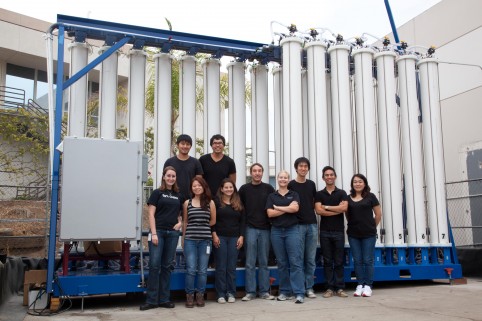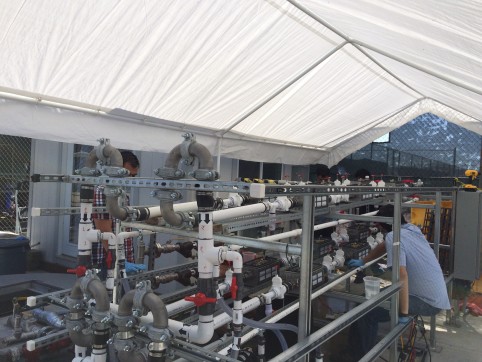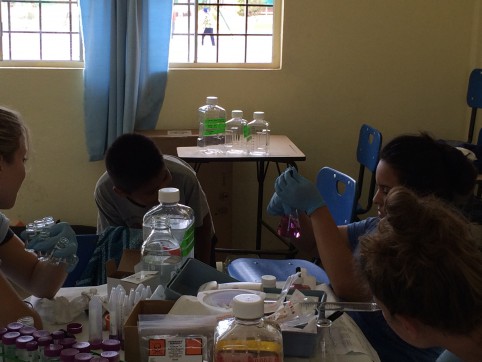Orianna Bretschger received her B.S. in Physics and Astronomy at the University of Northern Arizona. After a five- year career in aerospace and consulting, she completed a Ph.D. in Materials Science at the University of Southern California. Eager to focus her efforts on alternative energy and sustainability, she joined the J. Craig Venter Institute in 2008. Over the course of her research tenure, Dr. Bretschger has established a productive team of researchers dedicated to understanding the fundamental mechanisms associated with extracellular electron transfer (a process that enables microbes to respire solid surfaces, i.e., “breathe rocks”) and applying that understanding to technology development for bioremediation, bioenergy, and water recycling.

Dr. Bretschger and team at White Labs with JCVI constructed reactor.
Bretschger’s research group has secured over $11M of external funding from diverse resources including NASA, The State of California, The San Diego Foundation - Blasker Science and Technology Award, the National Science Foundation, the Office of Naval Research, Synthetic Genomics Inc. and the Roddenberry Foundation. Her publications have drawn over 800 citations and most recently includes an article in Nature Communications, which describes a novel metatranscriptomic method for understanding metabolic relationships in highly diverse (over 400 species) microbial communities and new findings related to how microbes share electrons. The approach developed by her team can now be applied to many different environmental samples and begins to unravel the complex interactions that exist in our sediments, soils, oceans and fresh water resources. These studies will shed new light on how our changing environment will impact ecosystem function.

Reacter installation at San Pasqual High School
Her applied projects include the development and integration of microbial fuel cell systems that can remove contaminants from wastewater and transform the waste into direct electrical energy. Bretschger’s most recent awards include a $5M grant from the Roddenberry Foundation to demonstrate her microbial fuel cell technology as a sustainable sanitation approach to address the sanitation and related public health impacts in Latin America. Further, a recent award from SPAWAR Pacific will test her technology at an S.E.R.E training base outside of San Diego and demonstrate its effectiveness for providing cost-effective water recycling and wastewater treatment to our militaries forward operating bases.

UABC and JCVI teams showing local elementary student how to do titrations while testing water quality in Baja MX.
Bretschger has developed methods for how to apply her technology for the removal of medications and other toxic personal care products from wastewater; and is developing new methods for addressing the removal of nitrogen and phosphorous from agricultural waste streams (two big factors in creating ‘dead zones’ in our coastal waters).
Growing up in the Southwest, access to water has always been paramount in Bretschger’s life. She lived through periods without access to plumbing and running water, and therefore knows first hand some of the basic challenges families face. One third of the world’s population has no access to sanitation, resulting in high child mortality rates and a critical lack of public health and safety. Today, Bretschger directs a lab of nine researchers and five interns (high school through master’s level students) and conducts collaborative work throughout San Diego and across the International boarder. Her installations can be seen at the San Pasqual High School Agricultural center and previously at White Labs. Bretschger believes her team is poised to have a real impact on the global sanitation crisis, she just needs more funding “ to go faster and to go bigger.” Her Roddenberry funded efforts will lead to the installation of improved sanitation systems at a school in San Quintin, Mexico over the next two years, and she hopes to expand these efforts globally to begin addressing the critical sanitation needs for nearly 2.6 billion people world-wide.

Looks like Dr Bretschger and her team are on the right track. They give new meaning to the phrase ‘Water is Life’. Go Team.
Excellent job. this great idea sounds like it would qualify for AmeriCorp/ VISTA grant funding for installations in struggling poor neighborhood High Schools and middle schools.
Every year AmeriCorp has surplus grant money for projects like yours. Good luck